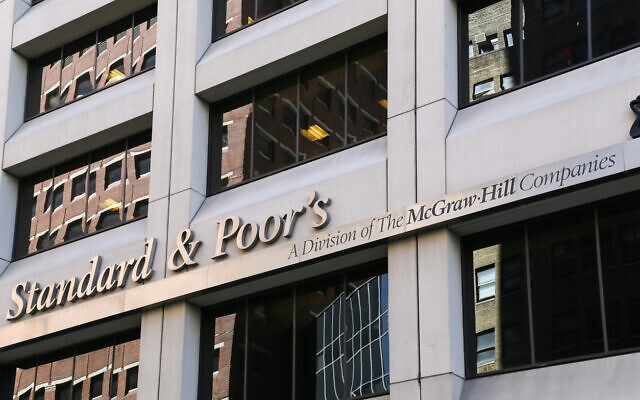S&P affirms Israel’s AA- rating, citing resilient economy despite security risks – The Times of Israel
S&P affirms Israel’s AA- rating, citing resilient economy despite security risks The Times of Israel

Credit rating agency Standard & Poor’s (S&P) has kept Israel’s favorable rating unchanged at AA- with a “stable” outlook, the Finance Ministry said Saturday evening, citing the company’s announcement released on Thursday.
The announcement was not readily available on S&P. Still, the agency cited Israel’s strong economic performance in the past year, a robust economy, and an “optimal debt structure,” according to the Finance Ministry.
S&P also expressed concerns over the political and security risks in the country, given the coalition’s loss of its already razor-thin majority and the future political landscape, as well as an ongoing wave of terror attacks that has claimed the lives of 19 people in Israel and the West Bank since late March.
S&P said it expects the Israeli economy to grow at a rate of 5.5% in 2022, following growth of over 8% in 2021, which surpassed forecasts and marking the highest financial growth rate recorded in Israel in 21 years, according to data published in February by the Central Bureau of Statistics.
The OECD had projected growth of roughly 6.3% in 2022 for Israel in its December 2021 Economic Outlook.
S&P noted Israel’s positive fiscal performance and a strong tech sector, which make up a resilient economy, as well as the “limited impact” of Russia’s war on Ukraine on Israel.

The headquarters of US financial company Standard and Poor’s (S&P) in lower Manhattan, New York. May 2014. (mixmotive via iStock by Getty Images)
“The stable outlook balances elevated geopolitical and domestic political risks and the pandemic-induced deterioration of Israel’s fiscal position, against the state’s persistently resilient economy, improving budgetary performance, and strong balance of payments,” the S&P announcement said according to Chinese state media Xinhua.
S&P expects an average inflation rate of 3.8% in 2022, noting that this rate is significantly lower compared to most developed countries. Inflation in the US, for example, reached a high of 8.5% in March, dropping to 8.1% in April.
Israel’s annual inflation rate hit 3.5% in February, the highest since 2011, and above the central bank’s target of between 1% and 3%. The Bank of Israel raised the benchmark interest rate to 0.35% last month from the 0.1% it had held since the beginning of the pandemic, a move meant to limit rising inflation and housing prices in Israel.
The central bank is expected to further raise the interest rate. It had revised its inflation forecast to reach 3.6% in 2022, while dropping to 2% in 2023.
The Consumer Price Index, which measures the price of an average market basket of consumer goods, rose by 0.6% in March compared to the month prior, according to the Central Bureau of Statistics. The increase since the beginning of the year was 1.5%, according to the data.

An aerial photo of the Tel Aviv Stock Exchange and the surrounding area, April 20, 2022. (Matanya Tausig/Flash90)
Housing prices marked a more dramatic increase — about 15% since last year.
Finance Minister Avigdor Liberman welcomed S&P’s rating and said the government was currently working on the 2023 state budget, “which will ensure continued growth for the citizens of the State of Israel.”
The rating came a month after another leading agency, Moody’s, upgraded Israel’s economic outlook from stable to positive and affirmed its credit rating as A1.
Moody’s cited Israel’s strong economic growth and the government’s “reform agenda” on challenges such as labor productivity and participation of under-represented communities in the workforce. Israel last earned a “positive” outlook from Moody’s in July 2018, which was later downgraded to “stable” in April 2020 when the COVID-19 pandemic started gaining pace in the country.
In February, Fitch Ratings reaffirmed Israel’s A+ rating with a stable outlook, also noting the country’s strong economic performance and a reduction of the fiscal deficit in 2021.



